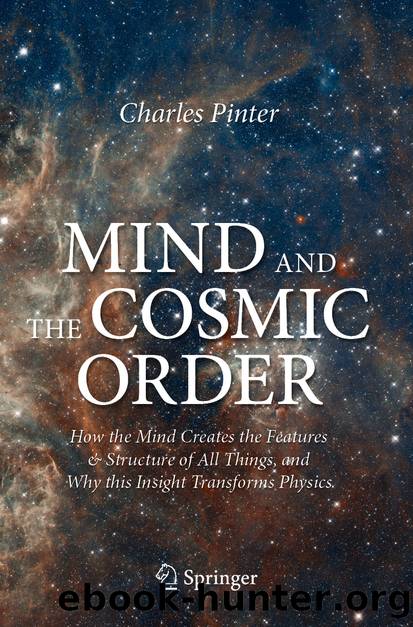Mind and the Cosmic Order by Charles Pinter

Author:Charles Pinter
Language: eng
Format: epub
ISBN: 9783030500832
Publisher: Springer International Publishing
© The Author(s) 2021
C. PinterMind and the Cosmic Orderhttps://doi.org/10.1007/978-3-030-50083-2_6
6. In Search of Reality
Charles Pinter1
(1)Lewisburg, PA, USA
Charles Pinter
Email: [email protected]
Facts
The Twentieth Century philosopher Ludwig Wittgenstein famously made the following statement:The world is the totality of facts, not of things.
He is not denying that there are things, but the world is dynamic, and all its objects are involved in relationships with each other at every instant, thereby giving rise to facts. Prior to Wittgenstein, his mentor Bertrand Russell had made a similar claim. Not only is all of reality a collection of facts, said Russell, but these facts consist of propositions which may be expressed in language. Russell made the additional assertion that facts are what exist: In other words, if you asked the question âwhat kinds of things exist in the universe?â, Russellâs answer would be that it is facts which exist.
How reasonable is it to contend that reality consists of facts? For instance: At this moment I am sitting at my kitchen table, my tea kettle is whistling, my cat is stretching, and outside it is snowing. Each of these is a simple fact, and together they partially constitute my local reality. I say âpartiallyâ, because other facts (or events) are taking place at the same time: For example, my heart is beating, my computer is charging, my eyes are blinking, and so on. Moreover, I am listing the facts at a particular level of description. Alternatively, I might have tried to account for the motion of every molecule in my surroundings, describing the displacement of each one in space-time. That would have been a different description of the same facts.
It is important to note that in order for a particular thing to exist, it must be possible to separate it out of the surrounding jumble, and perceive it as a single, well-defined entity. Consider the following fact: At precisely 10:19 a.m. on Wednesday July 24, 2019 my wristwatch slipped through my fingers, dropped onto the stone floor and stopped running. With these words I have successfully carved the event out of the general background.
If facts are things that exist, then it must be possible to individuate and uniquely designate each one. A fact may be identified by using words, as I have just done: Could there be, however, some alternative way of singling out a specific fact from the stream of ongoing reality? This is a very important question, because it determines whether facts are inevitably bound up with words. Could the mishap with my wristwatch be individuated in any other way than by the use of language? Clearly, the word âlanguageâ is not restricted to a natural language such as English, but may be any communicative medium, for example a symbolic code or the formal language of mathematics.
Language appears to be so intimately involved with reality that Wittgenstein considered reality to be nothing more than the set of all the propositions which describe it. Instead of a proposition being a linguistic representation of an objective fact, he claims that
Download
This site does not store any files on its server. We only index and link to content provided by other sites. Please contact the content providers to delete copyright contents if any and email us, we'll remove relevant links or contents immediately.
Sapiens: A Brief History of Humankind by Yuval Noah Harari(14351)
Sapiens by Yuval Noah Harari(5353)
Pale Blue Dot by Carl Sagan(4988)
Homo Deus: A Brief History of Tomorrow by Yuval Noah Harari(4893)
Livewired by David Eagleman(3757)
Origin Story: A Big History of Everything by David Christian(3679)
Brief Answers to the Big Questions by Stephen Hawking(3415)
Inferior by Angela Saini(3304)
Origin Story by David Christian(3191)
Signature in the Cell: DNA and the Evidence for Intelligent Design by Stephen C. Meyer(3121)
The Gene: An Intimate History by Siddhartha Mukherjee(3086)
The Evolution of Beauty by Richard O. Prum(2978)
Aliens by Jim Al-Khalili(2817)
How The Mind Works by Steven Pinker(2809)
A Short History of Nearly Everything by Bryson Bill(2679)
Sex at Dawn: The Prehistoric Origins of Modern Sexuality by Ryan Christopher(2509)
From Bacteria to Bach and Back by Daniel C. Dennett(2474)
Endless Forms Most Beautiful by Sean B. Carroll(2466)
Who We Are and How We Got Here by David Reich(2424)
